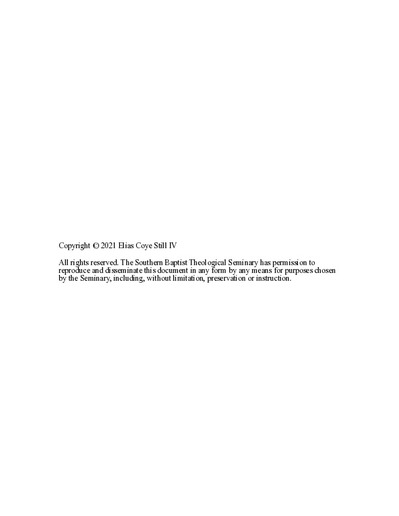| dc.description.abstract | This dissertation argues that the Tenth Commandment plays a formative role in Paul’s ethical instruction in the following ways: (1) Paul describes and defines sin using the Tenth Commandment (Rom 7:7; 1 Cor 10:6); (2) he connects covetousness and idolatry (1 Cor 10:6–7; Eph 5:5; Col 3:5); (3) he links violating the Tenth Commandment to violating other prohibitions from the second table of the Decalogue (Rom 13:8–10; 1 Cor 10:6–8; 1 Thess 4:3–7); and, (4) he presents covetousness as a test of faithful and unfaithful ministry (e.g., 2 Cor 2:17; 7:2; 12:11–18). To demonstrate this claim, thisdissertation undertakes an exegetical, historical, and canonical study of the Tenth Commandment in the Hebrew Bible, early Jewish literature, and Paul. Over the course of this investigation, it is demonstrated that the Tenth Word plays a more influential role in the ethical thought of Paul than previously recognized. Chapter 1 details the thesis, methodology, and significance of the project in addition to surveying some relevant research. Chapter 2 surveys the Tenth Commandment in the Hebrew Bible and early Jewish literature to answer the vital questions, what is the Tenth Commandment, and how would Paul have encountered it? Chapter 3 traces the connections between the Tenth Word, Genesis 2–3, and Numbers 11 in the Hebrew Bible, early Jewish literature, and Paul. Chapter 4 highlights the connection between covetousness and idolatry in 1 Corinthians 10:6–7, Ephesians 5:5, and Colossians 3:5 against the background of the Hebrew Bible and early Jewish literature. Chapter 5 shows that the violation of the Tenth Commandment results in the violation of the other prohibitions of the Decalogue in the Hebrew Bible and early Jewish literature, and Paul demonstrates this idea in Romans 13:8–10, 1 Corinthians 10:6–8, and 1 Thessalonians 4:3–7. Chapter 6 observes the phenomenon of the Tenth Commandment being particularly violated by the religious, economic, and political elite in the Hebrew Bible and early Jewish literature, and suggests this may influence Pauline thought on faithful and unfaithful ministry. Chapter 7 summarizes the findings of the investigation and offers implications. | en_US |

